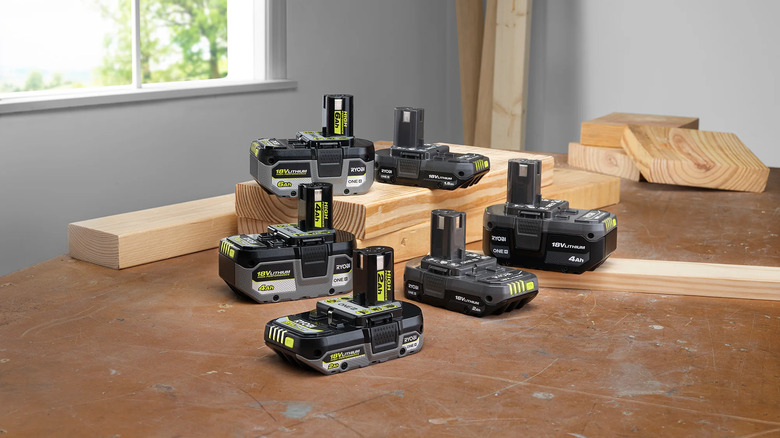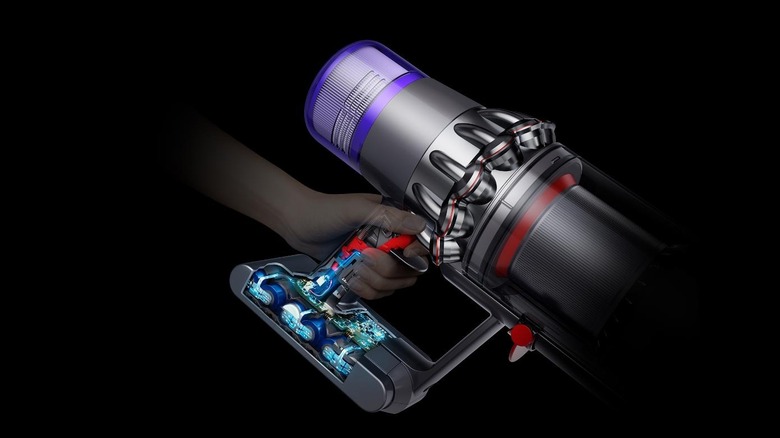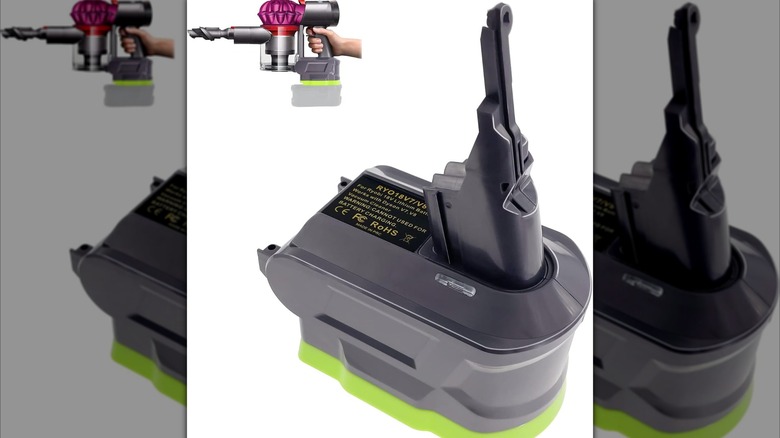Can You Use A Ryobi Battery On A Dyson Vacuum Cleaner?
We may receive a commission on purchases made from links.
Rechargeable battery packs aren't just for power tool brands like Ryobi. There are all kinds of household and professional gadgets that make use of this convenient framework. For example, certain models of Dyson vacuum cleaners, like the Dyson V8, V7, and V11, all utilize rechargeable battery packs. While this is very convenient for cleaning your house without being tied down to an outlet, it does come with a big asterisk: due to the way Dyson conducts business, should your Dyson vacuum's battery pack suffer a fatal problem like not charging, the only way to get an officially licensed replacement is to order one directly from Dyson. These replacement batteries can easily go for over $100, depending on your model.
If you find yourself in such an unenviable position, you might consider trying to beat the system and use a different brand's batteries on your Dyson vacuum. As we mentioned, Ryobi power tools use rechargeable batteries as well, and while they're not exactly cheap, they're certainly cheaper than Dyson batteries. Ryobi also makes its own stick vacuums, so that's another point of commonality. Unfortunately, this is one side route that won't get you where you want to go. Ryobi batteries use a completely different standard of connection, one that will not fit a Dyson vacuum natively. Technically, there are battery adapters floating around that could facilitate a connection, but using these unlicensed third-party products could prove problematic in the long run.
A Ryobi battery would not fit a Dyson vacuum
The thing that differentiates different brands of rechargeable battery packs, Ryobi and Dyson included, is the means by which they connect to a companion tool or device. Every tech brand uses its own proprietary connection format, ensuring you can only use its batteries with its products. This both saves it some work and covers its proverbial rear from dicey legal problems with other brands.
If we compare a Ryobi battery, such as a ONE+ 18V pack, to a Dyson battery for a V8 cordless vacuum, you can see the problem immediately. Ryobi's ONE+ battery system uses rectangular packs to hold the power cells, topped off by a stout stalk that houses the power terminals. This stalk is inserted into a tool to send power, linking up with receivers inside of it. A Dyson battery operates on a somewhat similar principle, but with several important distinctions. That V8 battery also has a flat bottom and a stalk, but the stalk is thinner and curved slightly. This is because the stalk is inserted directly into the vacuum's handle and interfaces with its trigger to regulate the flow of power.
Despite the casual similarities, the disconnect is clear: a Ryobi battery would never be able to fit into a Dyson vacuum's receiver. The stalk wouldn't fit into the opening, and even if it somehow could, the terminals wouldn't connect, and power wouldn't flow. Given Dyson batteries are designed to work in tandem with vacuum triggers, there's a good chance you wouldn't even be able to pull the trigger with a Ryobi battery crammed in there.
There are third-party adapters, but they come with risks and caveats
Given the distinct differences between Dyson's battery framework and that of Ryobi's or any other power tool brand's, there's simply no way to facilitate a functional connection between them. If you find that frustrating, you're likely not the only one, as there's an entire unofficial industry of battery adapters made by third-party brands and sold on platforms like Amazon. These adapters are designed to snap onto one specific brand of battery and plug into one specific brand of tool or device to deliver power.
There are adapters available to connect Ryobi batteries to Dyson vacuums, but there are some big caveats you need to be aware of. Firstly, these adapters are not one-size-fits-all. An adapter may receive Ryobi ONE+ batteries, but if its stalk isn't sized for your specific type of Dyson vacuum, it won't fit. For a Dyson V8, for example, you would specifically need a Ryobi ONE+ to V8 adapter.
The second, and arguably bigger, concern is that using battery adapters can potentially endanger your tools and batteries. Ryobi batteries are equipped with internal circuitry that helps to regulate and optimize power delivery for a connected tool. When you use a battery adapter, that circuitry is bypassed, and power is forced out. Forced, unoptimized power delivery could result in either undervolted, underwhelming performance in your vacuum, or a full-on power overload that ends up frying the motor. If either your Ryobi battery or your Dyson vacuum is damaged while using a third-party adapter, neither brand will help you, as using unofficial accessories violates their warranties.


